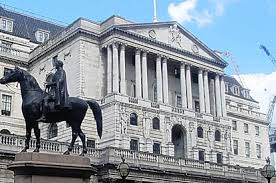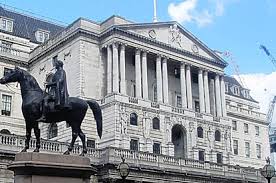
As the weak pound ramps up the costs of imports and squeezes family finances, the Bank of England has warned U.K. households to expect a sharp rise in inflation next year.
Noting a higher rise than in its last set of forecasts three months ago, the Bank said inflation would rise from 1.3% this year to 2.7% in 2017 and 2018 and predicted rises in petrol prices and other goods that the UK buys in from abroad. It would take until 2020 for inflation to get back to the target of 2% set by the government, said the monetary policy committee (MPC), led by the Bank’s governor, Mark Carney, in its new outlook.
Although the inflation warning was tempered with a projection that economic growth will be much stronger than previously forecast in the near-term, the Bank kept interest rates at a record low of 0.25% and dropped plans to cut them further in the near future and the new forecast was delivered amidst this environment.
The pound has come under fresh pressure in recent weeks over investor fears that the UK is heading for a hard Brexit deal that would leave it shut out of Europe’s single market after it had tumbled to 30-year lows in the wake of the vote to leave the EU. Changes to inflation forecasts were prompted as the sharp depreciation has made UK imports more expensive while making exports more competitive.
Sterling’s sharp fall made the Bank’s usual balancing act more challenging, said Carney, who has been forced to fend off criticism that he was overly gloomy on the potential blow to the economy from a leave vote.
He said that the MPC was making a trade-off between keeping inflation in check and shoring up growth and described the UK as facing “exceptional circumstances”. He said that it was appropriate for now to run a big programme of electronic money printing, known as quantitative easing and maintain the record-low interest rates.
“The MPC is choosing a period of somewhat higher consumer price inflation in exchange for a more modest increase in unemployment. However, there are limits to the extent to which above-target inflation can be tolerated,” Carney told a news conference.
A signal that policymakers were in no hurry to consider cutting interest rates further is what was interpreted by investors from his comments about the Bank’s sensitivity to inflation picking up. Price pressures in the economy would be further stoked up and more pressure would be put on the pound by another rate cut.
“If the relatively sanguine view presented in November’s inflation report proves correct, then another interest rate cut now looks unlikely,” said Paul Hollingsworth at the consultancy Capital Economics.
“Given that we think that the economy will surprise the MPC on the upside, and that inflation may be a bit stronger too, we think that the next move in interest rates will be up, and perhaps sooner than most expect,” Hollingsworth added.
Households had appeared to “entirely look through Brexit-related uncertainties”, Carney commented.
“For households, the signs of an economic slowdown are notable by their absence. Perceptions of job security remain strong. Wages are growing at around the same modest pace as at the start of the year. Credit is available and competitive. Confidence is solid,” he said.
(Source:www.theguardian.com)
Noting a higher rise than in its last set of forecasts three months ago, the Bank said inflation would rise from 1.3% this year to 2.7% in 2017 and 2018 and predicted rises in petrol prices and other goods that the UK buys in from abroad. It would take until 2020 for inflation to get back to the target of 2% set by the government, said the monetary policy committee (MPC), led by the Bank’s governor, Mark Carney, in its new outlook.
Although the inflation warning was tempered with a projection that economic growth will be much stronger than previously forecast in the near-term, the Bank kept interest rates at a record low of 0.25% and dropped plans to cut them further in the near future and the new forecast was delivered amidst this environment.
The pound has come under fresh pressure in recent weeks over investor fears that the UK is heading for a hard Brexit deal that would leave it shut out of Europe’s single market after it had tumbled to 30-year lows in the wake of the vote to leave the EU. Changes to inflation forecasts were prompted as the sharp depreciation has made UK imports more expensive while making exports more competitive.
Sterling’s sharp fall made the Bank’s usual balancing act more challenging, said Carney, who has been forced to fend off criticism that he was overly gloomy on the potential blow to the economy from a leave vote.
He said that the MPC was making a trade-off between keeping inflation in check and shoring up growth and described the UK as facing “exceptional circumstances”. He said that it was appropriate for now to run a big programme of electronic money printing, known as quantitative easing and maintain the record-low interest rates.
“The MPC is choosing a period of somewhat higher consumer price inflation in exchange for a more modest increase in unemployment. However, there are limits to the extent to which above-target inflation can be tolerated,” Carney told a news conference.
A signal that policymakers were in no hurry to consider cutting interest rates further is what was interpreted by investors from his comments about the Bank’s sensitivity to inflation picking up. Price pressures in the economy would be further stoked up and more pressure would be put on the pound by another rate cut.
“If the relatively sanguine view presented in November’s inflation report proves correct, then another interest rate cut now looks unlikely,” said Paul Hollingsworth at the consultancy Capital Economics.
“Given that we think that the economy will surprise the MPC on the upside, and that inflation may be a bit stronger too, we think that the next move in interest rates will be up, and perhaps sooner than most expect,” Hollingsworth added.
Households had appeared to “entirely look through Brexit-related uncertainties”, Carney commented.
“For households, the signs of an economic slowdown are notable by their absence. Perceptions of job security remain strong. Wages are growing at around the same modest pace as at the start of the year. Credit is available and competitive. Confidence is solid,” he said.
(Source:www.theguardian.com)





